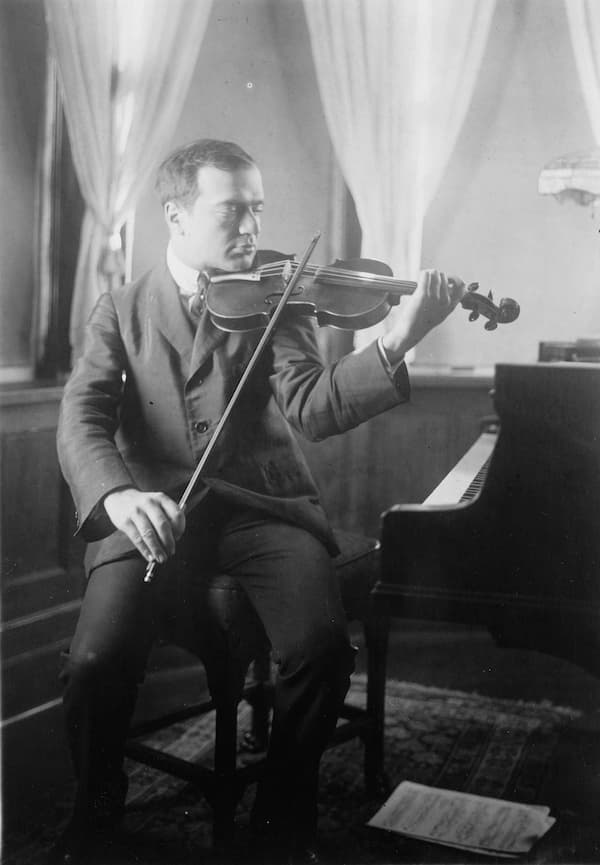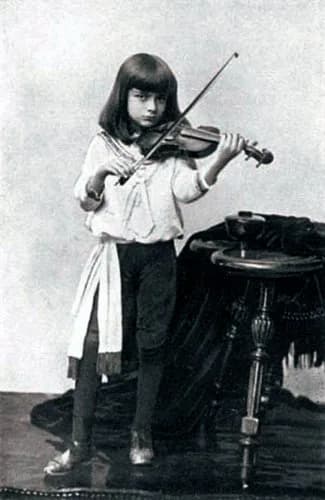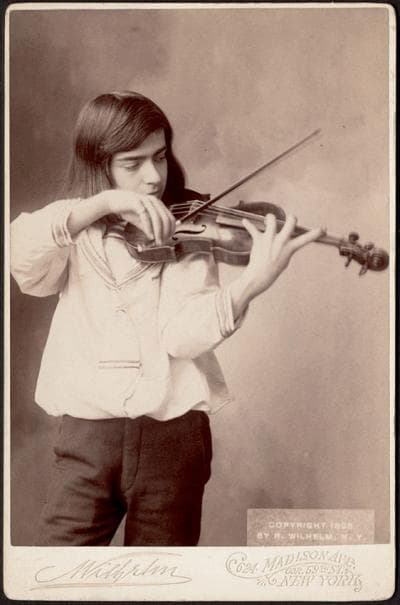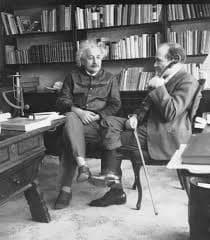Violinist Bronisław Huberman was able to fuse glowing intensity and visionary sensitivity into a grand classical design. His tone had a haunting quality, particularly in infinite shades of pianissimo, and he was a towering personality described as “the most remarkable representative of unbridled individualism.” A passionate advocate for Jewish refugees, he founded the Palestine Symphony Orchestra in 1936, helping to preserve Jewish musical culture and playing a crucial role in the development of Israel’s cultural identity.
Bronisław Huberman Performs Bach’s Violin Concerto No. 2 in E Major
Childhood Memories

Bronisław Huberman
Bronisław Huberman was born in Częstochowa in the Russian-ruled Congress Poland on 19 December 1882 to the lawyer Jankiel Huberman and his wife Aleksandra, née Goldman. His father worked in a law firm and was barely able to make enough money to feed his wife and their three sons. As Huberman explained, “my father had an extraordinary predilection for music and always regretted the fact that he himself was not a musician.” But one thing for sure, Huberman demonstrated an extraordinary musical talent at an early age.
As he related in an interview in 1911, “Already as a child, at four years old, I have heard my parents say that I could sing anything I heard. But goodness me! If all the children who can lisp musically and break up musical instruments instead of bricks and trains were as musical as their parents think, the world would be peopled with musical geniuses.”
Pablo de Sarasate: Carmen Fantasy, Op. 25 (after G. Bizet) (Siegried Schultze, piano; Bronisław Huberman, violin)
Musical Education

Bronisław Huberman in 1889
Although the family was constantly short of money, it was soon decided that Bronisław would take music lessons. Since pianos were too expensive, they bought a cheap violin for three roubles, and the boy started lessons at the Warsaw Conservatory with Mieczysław Michałowicz at the age of six. He also received lessons from Izydor Lotto, Maurycy Rosen, and the concertmaster of the Warsaw opera orchestra, Stanisław Barcewicz.
As Huberman relates, “my master saw much promise in his new pupil, as he discovered that my hands were specially made for violin playing. I did indeed make extraordinary progress in a short time, but that is natural, as one gains results quickly in musical subjects, because the accumulation of positive knowledge plays a less important part than in other branches of mental work, whereas direct skill – in which I include every kind of inspirational faculty – stands foremost in music.”
Bronisław Huberman Performs Mozart’s Violin Concerto No. 3 in G Major, K. 216
On His Way to Berlin

Bronisław Huberman at 14 years old
Huberman first appeared in public at the age of seven, performing Pierre Rode’s Violin Concerto No. 7 with the orchestra of The Warsaw Institute of Music. A number of public appearances followed, but in 1892, the Huberman family sold their furniture to fund a trip to Berlin. As such, Huberman played for the violinist, conductor and composer Joseph Joachim, one of the most influential musicians of his era. Joachim was known for his great dislike of “child prodigies”, and he did not accept Huberman as a student.
However, Joachim did arrange for a scholarship and for lessons with his student Carl Markees, who had taken over directorship of the Berlin Conservatory. Huberman took additional lessons with Charles Grigorowitsch, a student of the Polish violinist Henryk Wieniawski. According to Hubermann, “Gregorowitsch taught me all that could be learned from a teacher.” He took a few lessons with Hugo Heerman in Frankfurt and Martin Marsick in Paris, but as he proudly wrote later, “I had my last lessons at the age of 12.”
Henryk Wieniawski: Capriccio-valse in E Major, Op. 7 (Paul Frankel, piano; Bronisław Huberman, violin)
The Child Prodigy

Albert Einstein and Bronisław Huberman
With his formal lessons concluded, Huberman entered the concert circuit under the supervision of his father. Initial appearances brought him to the Netherlands, Belgium, Romania, Paris, and London. While in London, Huberman impressed the Spanish opera diva Adelina Patti, who engaged him for her farewell concert in Vienna in January 1895. After a solo recital, a critic wrote, “a surprising fire flowed from the small but yet so great violin virtuoso Huberman, who is set for a happy and revered future.”
The critic continued, “to us and to everyone else, the little Huberman seemed more like a magician than a common or garden child prodigy… he is in reality an exceptional talent who is already achieving great things and promises monumental things in the future.” In January 1896, Huberman performed the Brahms violin concerto in the presence of the composer and in front of Bruckner, Strauß, and Gustav Mahler. Brahms was touched and presented Huberman with an autographed photo. Huberman undertook a tour of the United States in 1896/97 and a lengthy tour of Russia in 1897/98. By age 15, he was so exhausted that he withdrew from concert life for four years.
For more of the best in classical music, sign up for our E-Newsletter
